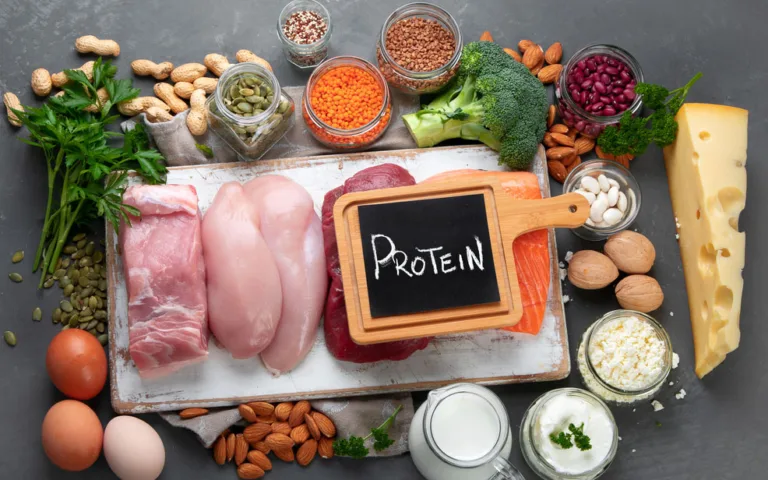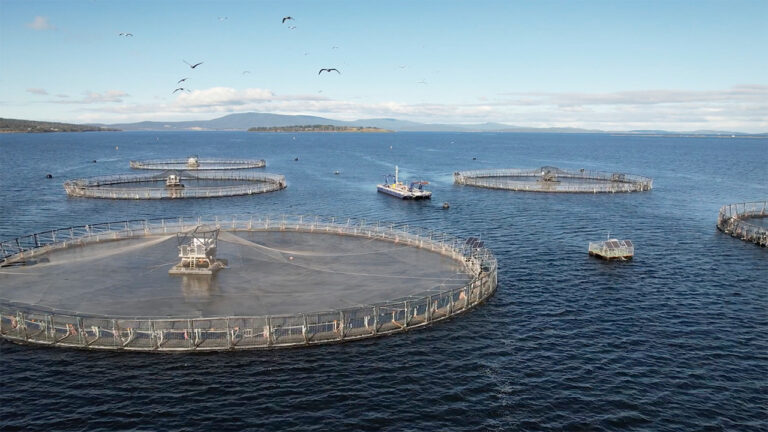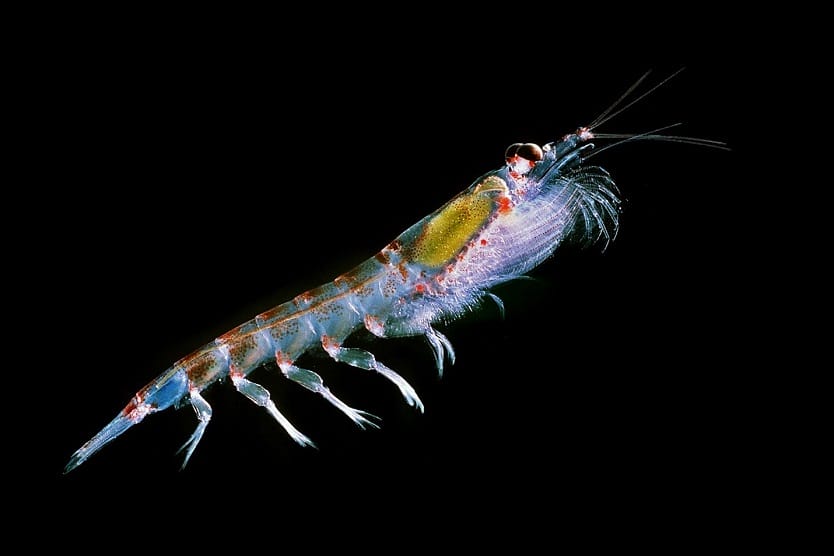Are you giving your body and baby all the nutrients they need during pregnancy? While most moms-to-be focus on prenatal vitamins, there’s one natural addition that can elevate your pregnancy nutrition: krill.
Packed with omega-3 fatty acids, antioxidants, and essential nutrients, krill oil and krill meat offer unique benefits to support maternal health and fetal development during this transformative time. From boosting your baby’s brain and eye development to easing inflammation and even stabilizing your mood. Plus, krill provides a clean, safe, and bioavailable source of omega-3s for pregnancy, making it a must-have for moms-to-be.
But how does it work, and what’s the right way to include it in your diet? Curious to know more? Let’s break down the benefits of krill in pregnancy and the recommended dosage to help you stay healthy and nourish your growing baby.
The Key Nutrients in Krill: Why They Matter in Pregnancy
Krill is a tiny seafood powerhouse loaded with nutrients essential for pregnancy. Each nutrient plays a unique role in supporting your body and your growing baby. Let’s dive into what makes krill so valuable during this special time.
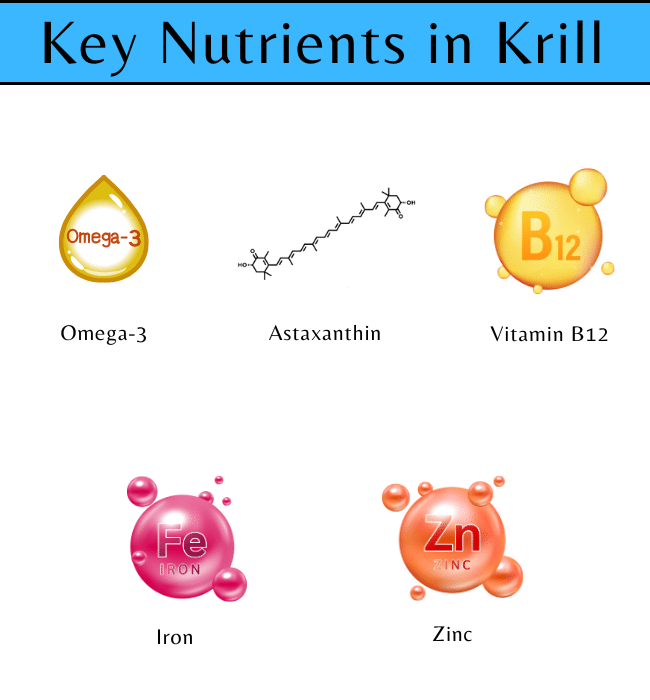
- Omega-3 Fatty Acids (DHA and EPA)
Omega-3s in krill oil are the real MVPs. DHA (docosahexaenoic acid) is crucial for your baby’s brain and eye development, helping lay the groundwork for cognitive and visual functions. EPA (eicosapentaenoic acid) complements DHA by reducing inflammation and improving blood flow, ensuring your body can handle the extra workload of pregnancy. What sets krill apart? Its omega-3s are bound to phospholipids, making them easier to absorb than traditional fish oil.
- Astaxanthin
This vibrant red antioxidant gives krill its unique color and offers serious protective benefits. Astaxanthin shields your cells from damage caused by oxidative stress, which is higher during pregnancy due to increased metabolic demands. It also helps your body cope with environmental stressors, making it a natural defense system for you and your baby.
- Protein (Found in Krill Meat)
Your body needs more protein during pregnancy to build and repair tissues for you and your growing baby. Krill meat delivers high-quality protein that’s lean and packed with essential amino acids, fueling muscle growth and organ development without unnecessary fats.
- Vitamin B12
B12 is a must-have for pregnancy. It supports the production of healthy red blood cells, which deliver oxygen to your baby. It also helps your nervous system stay in top shape, keeping you energized and reducing the risk of neurological complications.
- Iron
Iron is vital for producing hemoglobin, the protein in red blood cells that carries oxygen. Pregnancy significantly increases your need for iron, and krill meat provides an easily digestible source to keep your energy levels up and prevent anemia.
- Zinc
Zinc is your immune system’s best friend during pregnancy. It helps your body fight off infections while also aiding in cell growth and repair—key for your baby’s rapid development.
What Makes Krill Stand Out?
Krill’s nutrients come in highly bioavailable forms, meaning your body can absorb and use them more efficiently. For example, its omega-3s are easier to digest than those from standard fish oil, while its protein and micronutrients deliver big benefits in small portions. By including krill in your diet, you’re not just adding nutrients—you’re ensuring your body has the best tools to thrive throughout pregnancy.
Benefits of Krill in Pregnancy
The nutrients in krill pack a punch when it comes to supporting moms and their growing babies. Here’s how krill makes a difference:
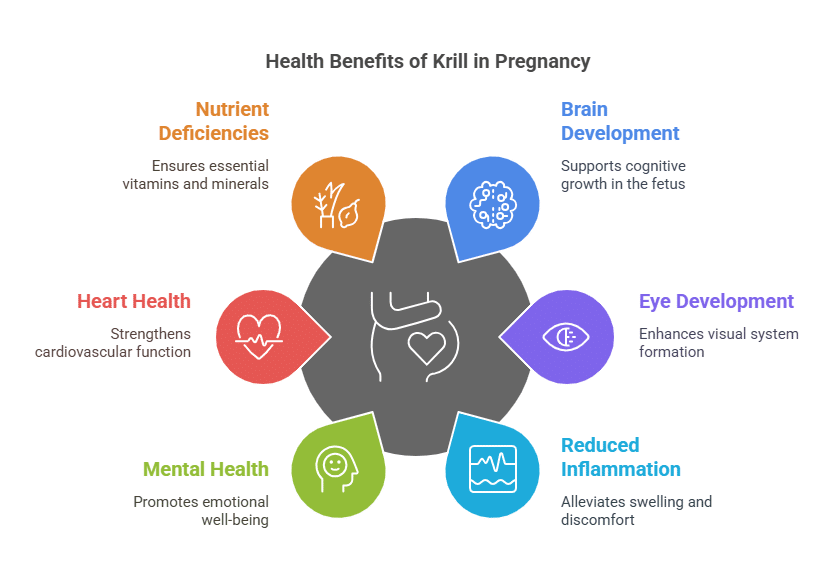
- Fetal Brain and Eye Development
Imagine laying the foundation for your baby’s sharp thinking and keen eyesight right from the start. The DHA in krill oil is like premium fuel for your baby’s developing brain and eyes. Studies show that DHA is linked to better cognitive skills, attention span, and even visual acuity in infants. Every serving of krill contributes to these vital milestones.
- Reduced Inflammation
Pregnancy is beautiful, but let’s be real—swelling, joint pain, and other inflammatory symptoms aren’t fun. Here’s where krill shines. The omega-3s (EPA) and Astaxanthin in krill act like calming agents for your body, reducing inflammation. Think of it as a natural way to ease discomfort while lowering the risk of conditions like preeclampsia, which affects many pregnant women.
- Mental Health Support
Feeling moody or overwhelmed? Hormonal shifts during pregnancy can take a toll on your emotions, but krill oil may help. Omega-3s play a key role in stabilizing serotonin levels—the hormone that keeps your mood in check. By including krill in your diet, you’re not just nourishing your body—you’re giving your mind the support it needs for a smoother emotional ride.
- Heart Health
Pregnancy puts extra pressure on your heart, so keeping it healthy is a top priority. The omega-3s in krill improve circulation and help manage blood pressure, ensuring your heart and your baby’s developing heart stay strong. Think of omega-3s as a team working to keep blood flowing smoothly and prevent issues like clotting.
- Prevention of Nutrient Deficiencies
Fatigue and low energy? These could be signs of common nutrient deficiencies during pregnancy. Krill is a small but mighty source of iron, zinc, and B12—all essential for energy, oxygen delivery, and immune health. These nutrients also help your baby grow strong while keeping you on your feet for all those nursery prep tasks
Krill Dosage During Pregnancy
How much krill should you take to safely enjoy its benefits? Here’s what you need to know:
Krill Oil Dosage
- Recommended Dose: 300-500 mg of omega-3s daily, which translates to 1,000-2,000 mg of krill oil per day (depending on the product’s EPA and DHA content).
- How to Take It:
- Take krill oil with meals to improve absorption, as omega-3s are fat-soluble.
- Pair with healthy fats like avocado or nuts to maximize effectiveness.
- When to Start:
- It’s best to begin taking krill oil as early as possible—even when trying to conceive—and continue throughout your pregnancy and breastfeeding journey.
Krill Meat Intake
- Recommended Amount: 1-2 servings per week, depending on your overall seafood consumption.
- Serving Size: A typical serving of krill meat is around 3-4 ounces (about the size of a deck of cards).
- How to Prepare:
- Steam or stir-fry krill meat and add it to salads, soups, or grain bowls.
- Use it as a lean protein substitute in tacos, pasta, or rice dishes.
Safety Note:
Always consult your healthcare provider before adding krill oil or krill meat to your diet, especially if you:
- Have a seafood allergy.
- Are on blood-thinning medications.
How to Choose the Right Krill Products
To ensure you’re getting the safest and most effective krill products during pregnancy, follow these tips:
- Look for High-Quality Supplements
- Choose krill oil products that are third-party tested for purity and potency.
- Opt for brands that use sustainably sourced krill to protect the environment.
- Check the Omega-3 Content
- Ensure the supplement provides at least 200-300 mg of DHA and EPA per serving.
- Go for Fresh, Sustainably Sourced Krill Meat
- Look for frozen or canned krill meat labeled as sustainably sourced.
- Avoid Overconsumption
- While krill is nutrient-rich, excessive omega-3 intake (over 3,000 mg/day) may thin the blood, so stick to recommended doses.
Final Thoughts: Why Krill is Perfect for Pregnancy
Pregnancy is a time of remarkable transformation, and your nutritional needs grow as your baby does. Incorporating krill oil or krill meat into your diet is one small yet impactful choice that can support your baby’s development while keeping you healthy and energized.
With brain-boosting omega-3s, inflammation-fighting antioxidants, and essential nutrients, krill goes beyond what traditional prenatal supplements offer. It’s a clean, nutrient-rich solution that works to nourish both you and your baby from the inside out.
Whether you choose to take krill oil supplements or savor a delicious krill meat dish, you’re making a proactive decision to enhance your pregnancy journey. After all, the smallest choices—like adding krill to your routine—can create a lasting difference for you and your little one.





